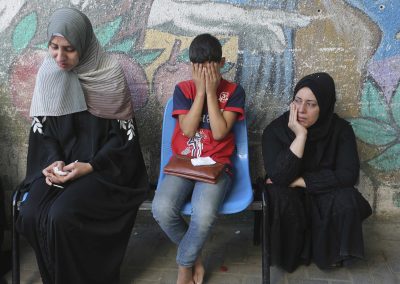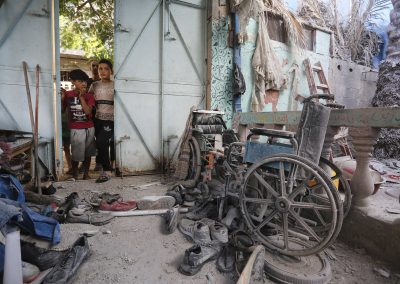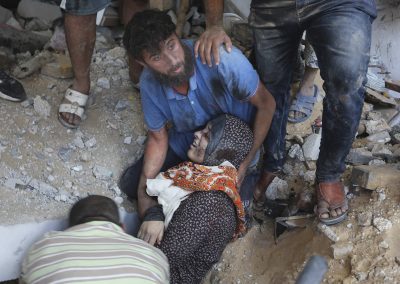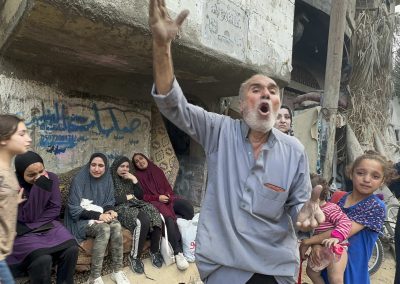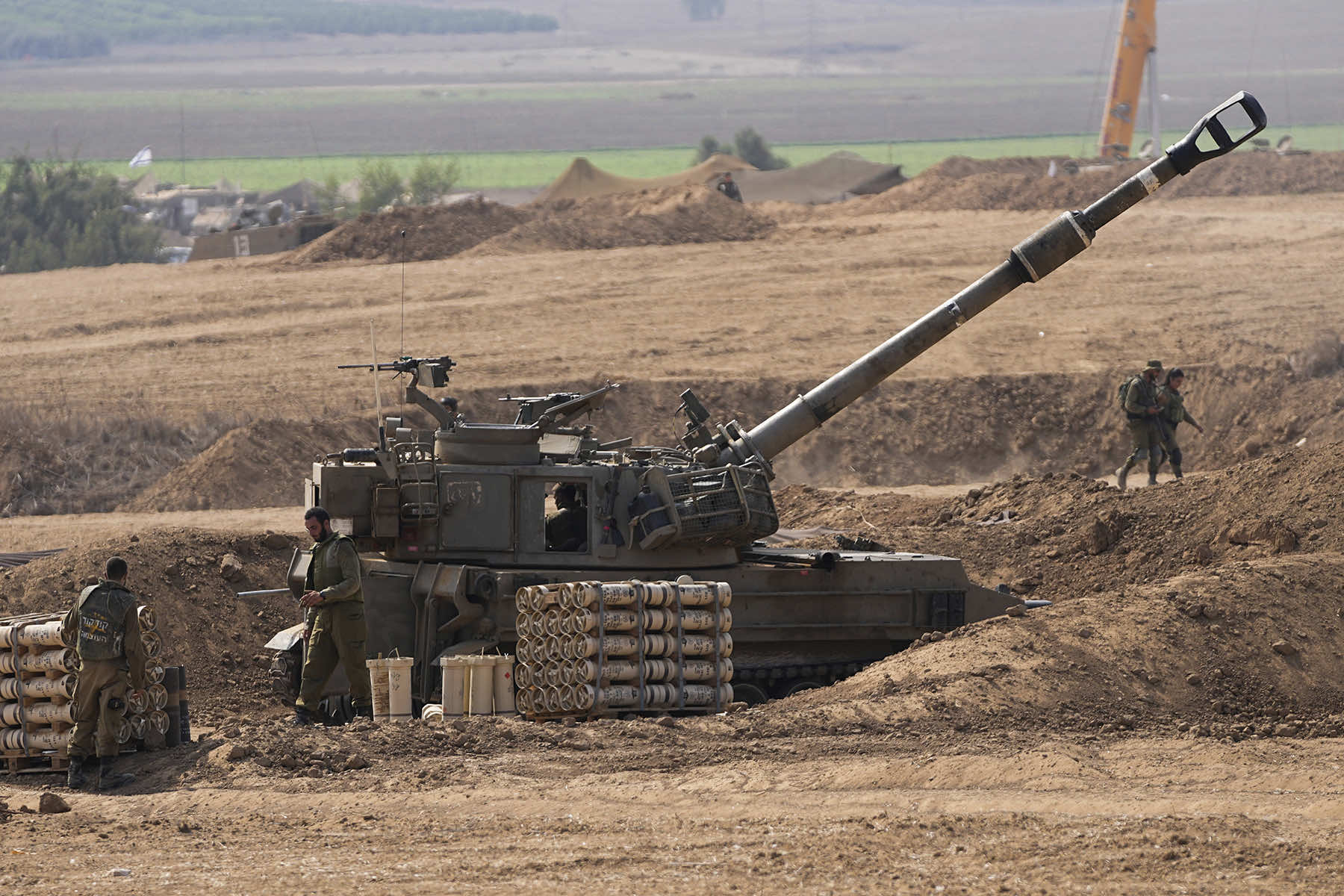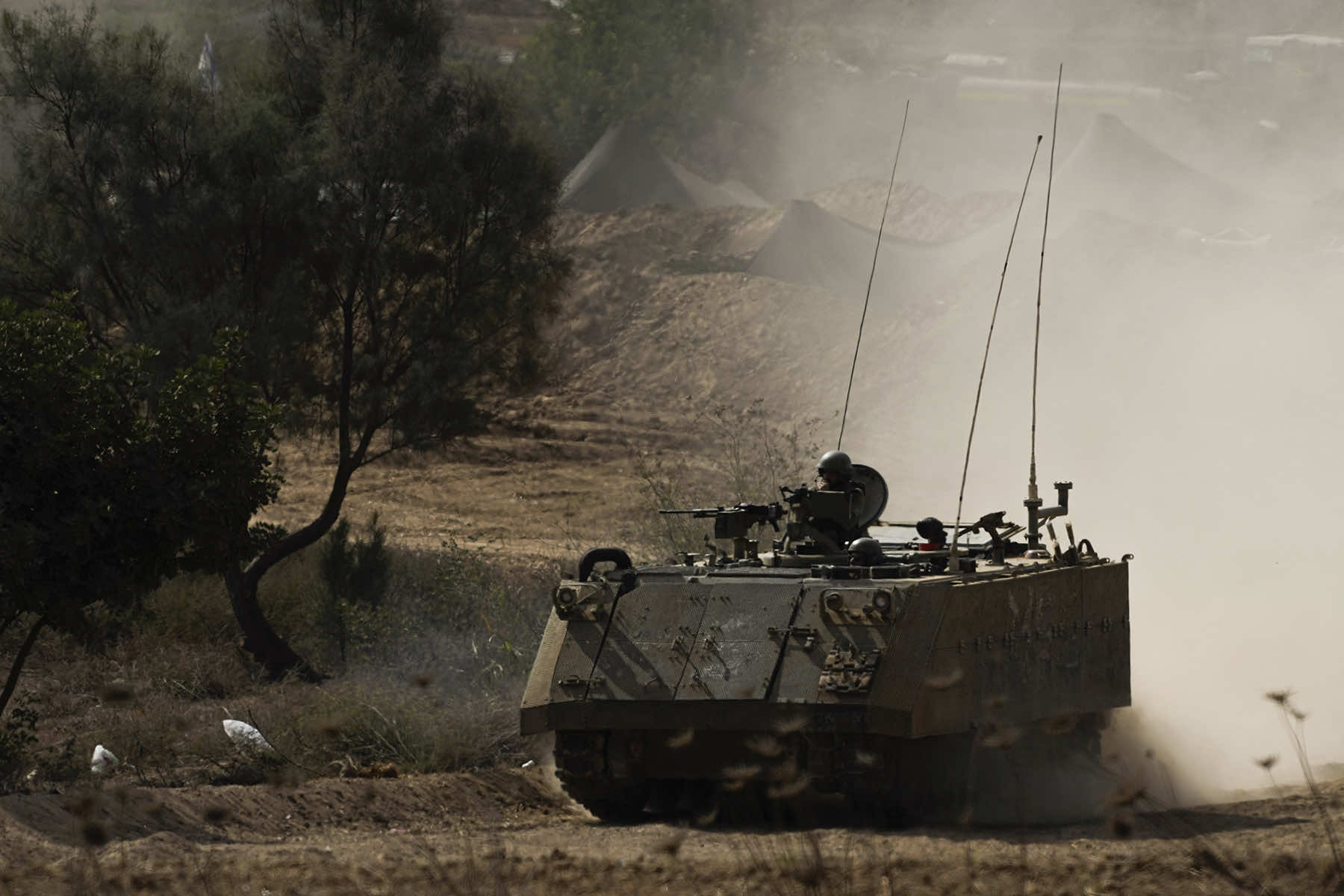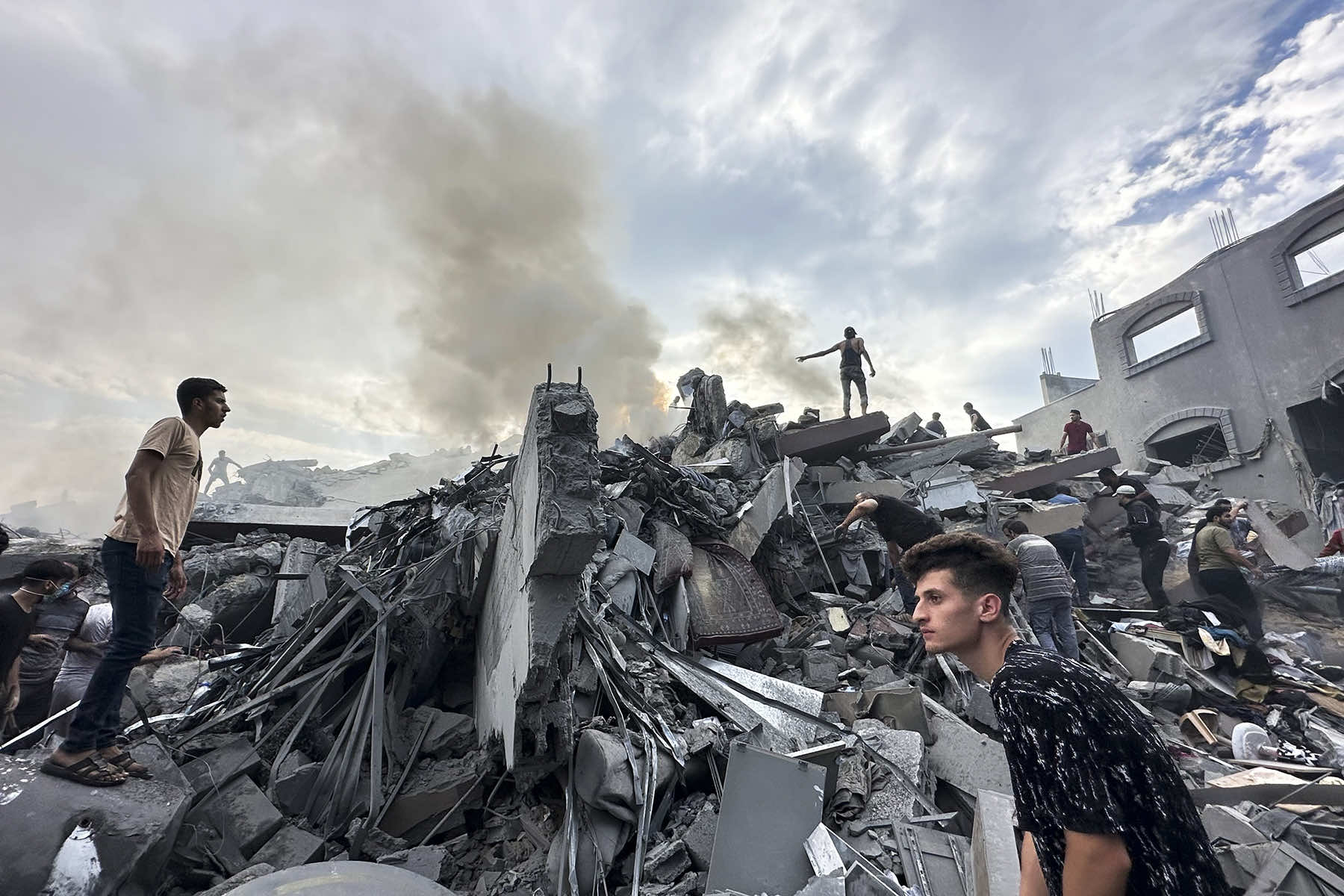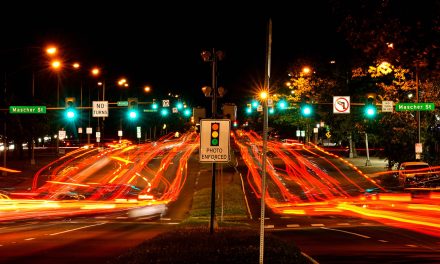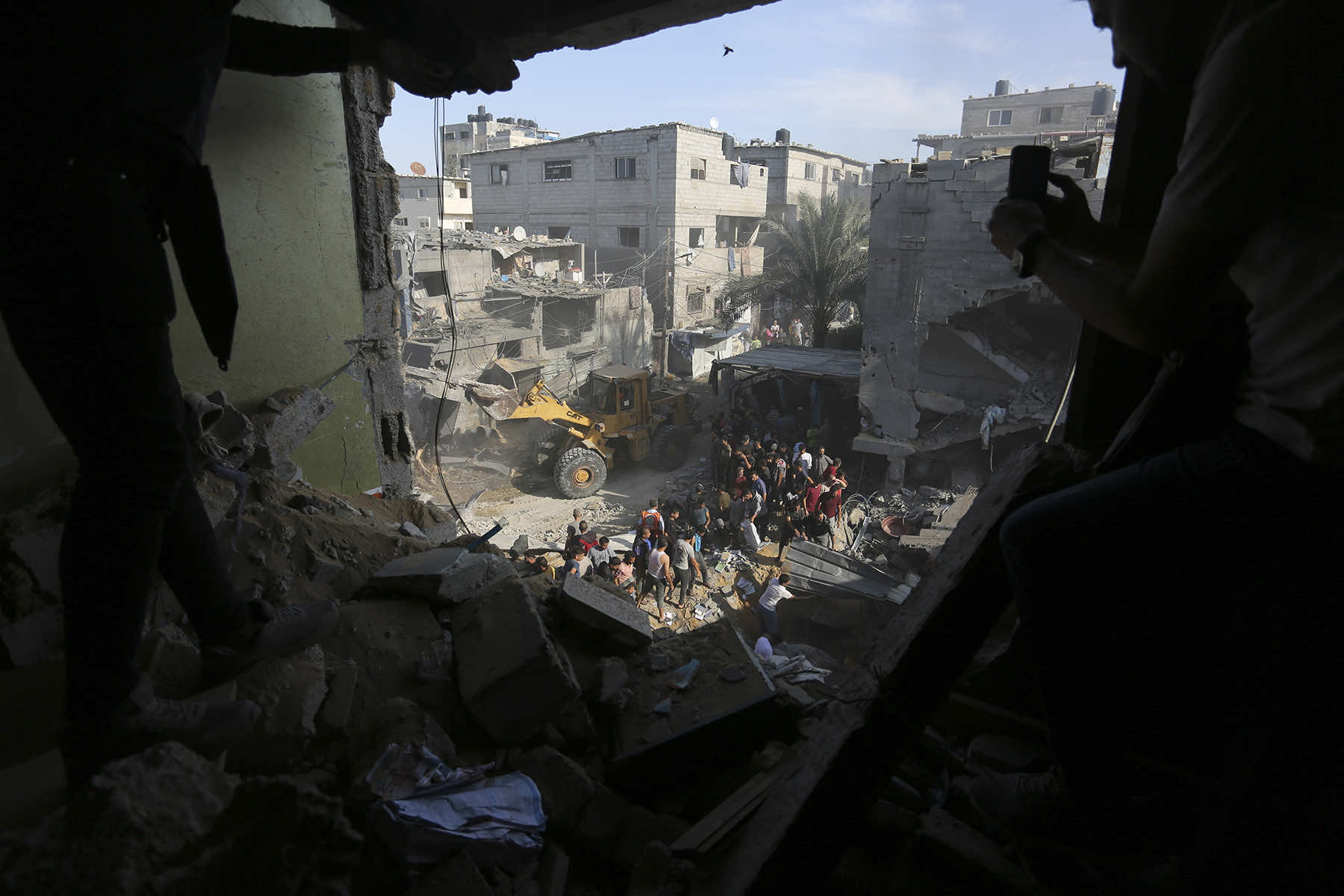
A flurry of Israeli airstrikes on October 31 on a refugee camp near Gaza City leveled apartment buildings, leaving craters where they once stood, as ground troops battled Hamas militants across northern Gaza and attacked underground compounds.
The Hamas-run Interior Ministry said at least six airstrikes destroyed a number of apartment blocks in Jabaliya, and it reported a large number of casualties but did not immediately provide details.
The Israeli military said on October 31 it carried out a wide-scale strike in Jabaliya on Hamas infrastructure “that had taken over civilian buildings” and that tunnels under the buildings collapsed. It said the strikes killed a large number of Hamas militants, including Ibrahim Biari, who it said oversaw operations in the northern part of the strip.
Israel said two of its soldiers were killed in fighting in northern Gaza, the first military deaths reported since the ground offensive into the tiny Mediterranean territory accelerated in late October.
With several hundred thousand Palestinians still in the northern part of Gaza, Israeli troops and tanks reportedly have advanced on several sides of Gaza City, the sprawling urban center.
Casualties are expected to mount on both sides as the battle moves into dense, residential neighborhoods, even as overwhelmed hospitals in the north warn they are nearing collapse with supplies largely cut off and strikes hitting nearby. Prime Minister Benjamin Netanyahu rejected calls for a cease-fire and again vowed to crush Hamas’ ability to govern Gaza or threaten Israel following its bloody October 7 rampage, which ignited the war.
In the Jabaliya refugee camp, a densely built-up area of small streets on Gaza City’s outskirts, footage of the scene from Al-Jazeera TV showed at least four large craters where buildings once stood, amid a large swath of rubble surrounded by partially collapsed structures.
Dozens of rescue workers and bystanders dug through the wreckage, searching for survivors beneath the pancaked buildings. Young men carried the limp forms of two children from the upper floors of a damaged apartment block’s crumbling frame while helping down another child and woman. It was unclear whether the children were alive or dead.
Also on October 31, the Israeli military said ground troops took control of a Hamas military stronghold in west Jabaliya, killing 50 militants.
Hamas spokesman Hazem Qassem denied the military’s claim, saying it was trying to justify “its heinous crime” against civilians.
More than 8,500 Palestinians have been killed in the war, mostly women and minors, the Gaza Health Ministry said, without providing a breakdown between civilians and fighters. The figure is without precedent in decades of Israeli-Palestinian violence.
Over 1,400 people have died on the Israeli side, mainly civilians killed during Hamas’ initial attack, also an unprecedented figure. Palestinian militants also abducted around 240 people during their incursion and have continued firing rockets into Israel.
A day after Israel’s first successful rescue of a captive held by Hamas, the spokesman of the militant group’s armed wing said they plan to release some non-Israeli hostages they are holding in the coming days. Hamas has previously released four hostages, and has said it would let the others go in return for thousands of Palestinian prisoners held by Israel, which has dismissed the offer.
More than half of Gaza’s 2.3 million Palestinians have fled their homes, with hundreds of thousands sheltering in packed U.N.-run schools-turned-shelters or in hospitals alongside thousands of wounded patients.
The war has also threatened to ignite fighting on other fronts. Israel and Lebanon’s Hezbollah militant group have traded fire daily along the border, and Israel and the U.S. have struck targets in Syria linked to Iran, which supports Hamas, Hezbollah and other armed groups in the region.
The military said it shot down what appeared to be a drone near the southernmost city of Eilat and intercepted a missile over the Red Sea on October 31, neither of which entered Israeli airspace.
Iranian-backed Houthi rebels in Yemen later claimed they fired ballistic missiles and drones at Israel, saying it was their third such operation and threatening more. Earlier this month, a U.S. Navy destroyer in the Red Sea intercepted missiles and drones launched toward Israel by the Houthis, who control much of northern Yemen.
In the occupied West Bank, where Israeli-Palestinian violence has also surged, the army demolished the family home of Saleh al-Arouri, a senior Hamas official exiled over a decade ago. An official in the village of Aroura said the home had been vacant for 15 years.
Israeli Defense Minister Yoav Gallant said the military was deploying forces “on a large scale, in the depths of Gaza.”
“Achievements on the battlefield have been very high. Unfortunately, in war there is also a price, and in the last day the price has been high,” he said, referring to the two soldiers’ deaths.
Israeli forces reportedly have advanced north and east of Gaza City. South of the city, Israeli troops were also trying to cut off the territory’s main highway and the parallel road along the Mediterranean coast, according to Dawood Shehab, a spokesperson for Islamic Jihad, a smaller militant group allied with Hamas.
The military said it struck some 300 militant targets over the past day, including compounds inside tunnels, and that troops had engaged in several battles with militants armed with antitank missiles and machine guns.
Video footage released by the military showed soldiers and a tank moving down a dirt road between two rows of demolished buildings, some of them three to four stories high. Israel says it targets Hamas fighters and infrastructure and that the militants operate among civilians, putting them in danger.
Hamas released its own video showing what it said was a battle in northern Gaza on October 29. A fighter wearing a GoPro-style camera emerged from a tunnel with a rocket-propelled grenade launcher and ran across sand dunes and shrubs with other militants amid the clatter of gunfire.
It was not possible to independently confirm reports by either side.
Gaza’s humanitarian crisis continued to worsen.
The World Health Organization said two hospitals have been damaged and an ambulance destroyed in Gaza over the last two days. It said all 13 hospitals operating in the north have received Israeli evacuation orders in recent days. Medics have refused such orders, saying it would be a death sentence for patients on life support.
Gaza City’s Shifa Hospital, the largest in the territory, is on the verge of running out fuel, the Health Ministry said.
There has been no central electricity in Gaza for since early October, and Israel has barred the entry of fuel needed to power generators for hospitals and homes, saying it wants to prevent it from falling into Hamas’ hands.
It has allowed a limited amount of food, water, medicine and other supplies to enter from Egypt, though far less than what is needed, relief groups say. A convoy of 59 aid trucks entered through the Rafah Crossing with Egypt on October 31 — the largest yet — bringing the total that have entered since October 22 to 216, according to Wael Abu Omar, Hamas’ spokesperson for the crossing.
The U.N. agency for Palestinian refugees, known as UNRWA, says 64 of its staff have been killed since the start of the war, including a man killed alongside his wife and eight children in a strike late October 30.
“This is the highest number ever of U.N. aid workers killed in any conflict around the world in such a short time,” spokesperson Juliette Touma told The Associated Press. “UNRWA will never be the same without these colleagues.”
Some 800,000 people have heeded the Israeli military’s orders to flee from the northern part of the strip to the south, according to Jonathan Conricus, an Israeli military spokesman. Northern Gaza was estimated to have a pre-war population of around 1.1 million.
The window to flee south may be closing, as Israeli forces reached Gaza’s main north-south highway. Video circulating on October 30 showed a tank opening fire on a car that had approached a sand berm but was turning around. Gaza’s Health Ministry said three people were killed.
Zaki Abdel-Hay, a Palestinian living a few minutes’ walk from the road south of Gaza City, said people are afraid to use it. “People are very scared. The Israeli tanks are still close,” he said over the phone, adding that “constant artillery fire” could be heard near the road.

